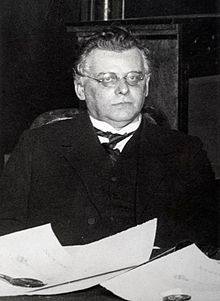Carel Gerretson
You can help expand this article with text translated from the corresponding article in Dutch. (April 2010) Click [show] for important translation instructions.
|
Carel Gerretson | |
|---|---|
 Gerretson in 1939 | |
| Personal details | |
| Born | Frederik Carel Gerretson 9 February 1884 Kralingen, Netherlands |
| Died | 27 October 1958 (aged 74) Utrecht, Netherlands |
| Political party | |
| Alma mater |
|
Doctor Frederik Carel Gerretson (born
Early years
Gerretson was educated in a public elementary school in
Academic career
Gerretson was a professor of colonial history at the
Gerretson also published books on a number of books on the
Using the pseudonym Geerten Gossaert, Gerretson also became noted as a poet with his work De moeder receiving regular reprints. He also published works under the name Arthur Lawick.[5]
Political career
Gerretson's nationalist principles led him to politics and he initially was associated with the
Gerretson returned to the CHU and became a leading figure in the party at the head of a pro-colonial faction based in Utrecht. A strong voice on the right of the party, noted for his rhetoric, Gerretson would later become an isolated figure within the CHU.
